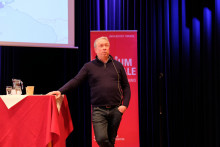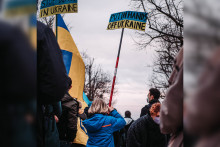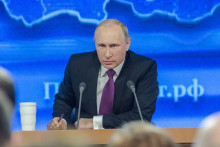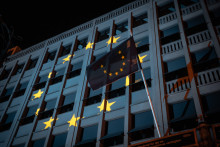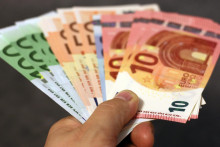Where were we? The Russian invasion, on 24 February, is now over six months ago. There are three important things going on at the moment, says Donnelly. First, there are the ongoing problems concerning the Zaporizhzhya nuclear power plant, which has fallen into Russian hands. Then there is the Ukrainian offensive in the south. And thirdly, the gas supplies by Russia and the implications for Europe.
According to Donnelly, not much is known about the Ukrainian counter-offensive in the south, mainly because the country itself reports little about it. Last summer, Ukraine struck targets behind enemy lines, such as ammunition depots and infrastructure, in order to weaken Russia. 'I don't expect the offensive to go quickly. An offensive military operation is very hard and risky. However, the Ukrainians' objective is clear: the reconquest of Kherson, strategically located near the Black Sea. For now, it remains to be seen how the operation will turn out.’
Meanwhile, Ukraine has little to expect from Europe when it comes to arms supplies, Donnelly says. In this area it can only count on the help of the United States. ‘Western Europe has not been willing to do much more than send money, leaving it to eastern EU countries with fewer resources to send arms.’ According to the researcher, much depends on who is elected president of the United States in 2024. 'If Donald Trump ends up in the White House again, the assistance from the US to Ukraine will decrease drastically. Putin will try to help that happen.'
Long-term war
Russia's gas supplies to Europe also remain a key issue, particularly for Germany. ‘For Germany, there are other reasons besides economic grounds as well. Because of Germany's role in the Second World War, and the millions of war victims in Russia, there is still a sense of guilt. In German politics there has always been a pro-Russian component. And there is concern about how the conflict eventually pans out. It makes for a hedging approach to this war.’
Nevertheless, there are favorable developments on the energy front, Donnelly says. Europe has managed to reduce consumption and to fill its gas reserves more than expected. ‘Putin did not shut off the gas supply all at once. He did it gradually and tried to create uncertainty.' According to Donnelly, Putin is gambling on reduced support in the West for Ukraine due to rising (energy and food) prices, especially over the winter. ‘The Russian president benefits from moving slowly. For him, it is vital that he does not lose the war. That is all he has to do for the moment. Since the outbreak of the war, China has also been buying more gas from Russia, and selling it onward to help circumvent sanctions, which strengthens his position.’
Domestic market
In order to turn the tide, the UT researcher believes that Europe needs to invest more in its own industry. ‘This is already happening in the US, where they are increasingly focusing on the domestic market by investing in employment, industry and infrastructure.’ This is not an easy task, Donnelly knows. ‘Since the West has become highly dependent on resources and products from problematic countries like Russia and China over the past 30 years. Adjustment will be costly, but we’ll be more secure with better jobs and industry if we get the policies right.'


